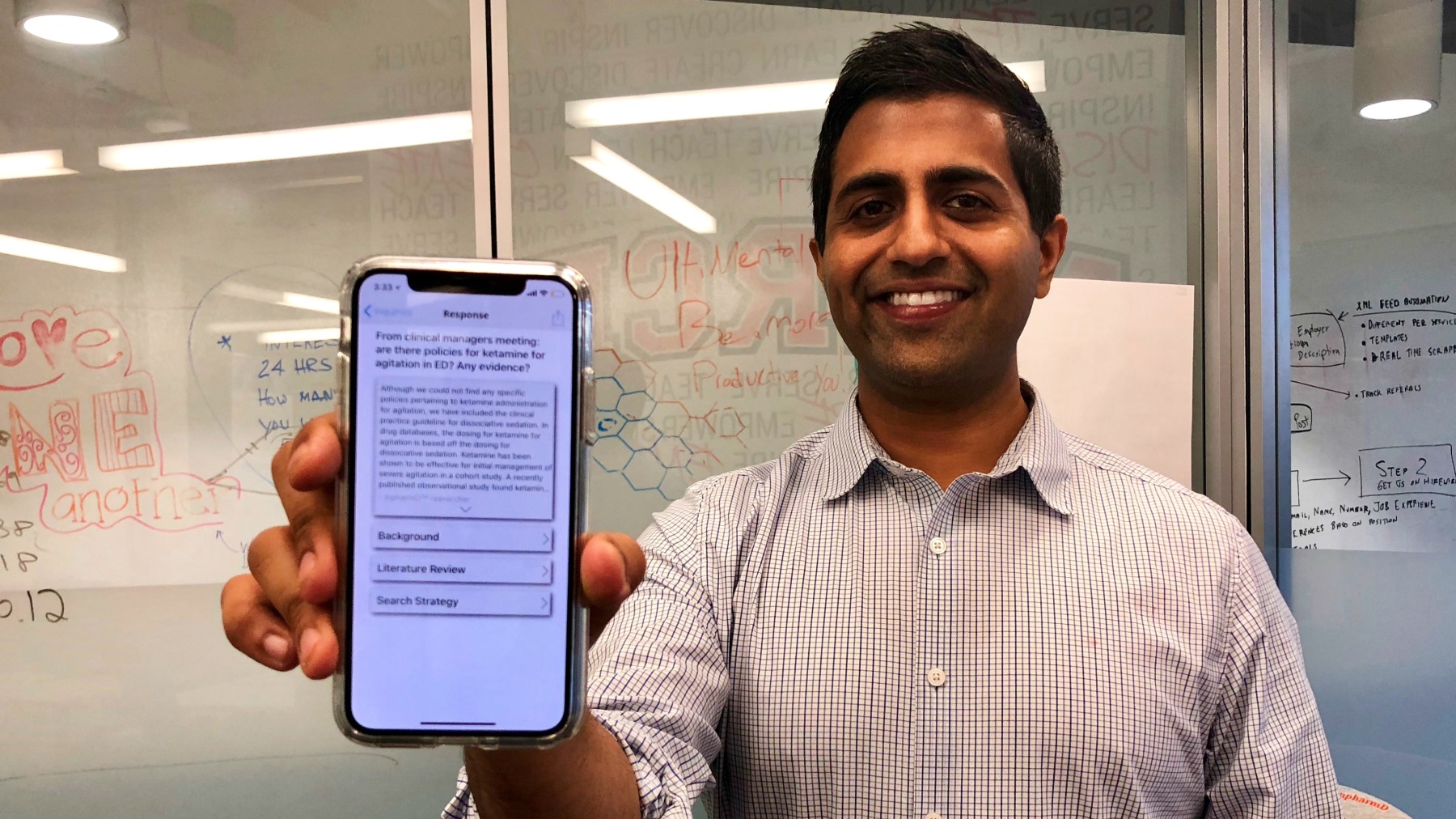Tech Startup InpharmD, WellStar Sign Deal To Provide Mobile Medical App

Dr. Ashih Advani shows his company’s app, InpharmD, on his smartphone. A decade ago, Advani started pitching the idea of an app that allowed health providers a way to submit questions and get back answers in a timeframe that allowed them to better care for patients.
Jim Burress / WABE
Smartphone apps that allow patients to communicate with their health care providers using only their cellphones have gained popularity, but an app developed by an Atlanta-based startup is moving the concept forward.
InpharmD (pronounced similar to the word “informed”) has physicians, not patients, reaching into their pockets and pulling out their iPhones. In the process, they’re able to unlock unprecedented amounts of evidenced-based research and knowledge.
InpharmD is the first app of its kind that allows doctors to submit questions of any complexity about medications and get custom answers back relatively quickly — just a few hours on average.
Dr. Ashih Advani, himself a pharmacist, came up with the InpharmD concept a decade ago when he saw Domino’s introduce a mobile pizza-ordering app. Impressed by how streamlined the app made ordering food, he thought the same efficiency and ease of use would be a welcome addition to the medical field.
“This is where we started — in this room right here,” Advani explains at InpharmD’s somewhat triangular-shaped, dorm-sized office at Atlanta Tech Village in Buckhead.
In bold, big letters on one wall reads “Mercer University.” The private university provided initial seed money for the project, a first for Mercer, Advani says. Getting the space was a huge move forward three years ago, Advani says, as if he’s still in disbelief the glass-enclosed space is his.
Efficiency. Savings. Productivity. Dr. Advani beams with excitement as he talks about the promise InpharmD holds for the medical community.
As he talks, a sentence or two of text appears on a widescreen computer monitor on a desk in the corner. Somewhere in metro Atlanta, a doctor just used the app to ask a drug-related question. That physician could chase down the answer, but searching through complex and time-consuming databases often is impractical.
Questions run the gamut, from the simple to the impossibly complex. Neil Patel, a drug information pharmacist and one of a handful of employees on InpharmD’s payroll, is fielding those coming in.
“You really never know what to expect,” Patel says. “It could be a simple dosage question, or it could be something that I would have to look up, a complete disease state that I’ve never heard of.”
Based on workload, question complexity or any number of factors, Patel can either field the inquiry himself or send it on to a network of academic drug information centers. There are 100 across the country, staffed mostly by pharmacy students. InpharmD relies on four, including nearby Mercer University.
Advani says he can’t disclose financials but says the app saves doctors time and the health systems they work for money — $5 million in one year for the two Atlanta hospitals that piloted the app, he claims.
Dr. Francisco Prada wasn’t concerned with the app’s cost (InpharmD’s model puts any cost burden on the health system, not the physician directly). But he’s quick to talk about the time-savings and convenience InpharmD offers. Prada first used the app as a resident at Atlanta Medical Center while it was undergoing development.
Now that he’s going into private practice, Prada hopes to keep the resource.
“I think this will take off. I’d like it to take off, I believe, because it does save time,” he says.
If there’s anything Prada would like to see improved, it’s the timeliness of a response. But he says he understands why questions can’t be answered instantly.
Yet.
Part of InpharmD’s ongoing development includes integrating artificial intelligence. Eventually, Advani says, a computer could assess and respond to most any inquiry in a matter of seconds. That’s down the road, as is a companion app that would be for patients’ use.
Advani wouldn’t disclose what InpharmD costs health providers, saying it depends on a number of factors.
But Georgia’s largest health system seems sold on whatever the cost is. WellStar liked the tool so much, it just signed a three-year deal to provide InpharmD to all of its network of hospitals and physicians.





